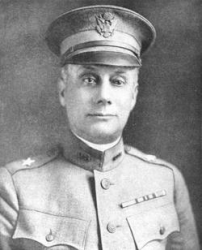
 |
|
|
||
|
William Mason Wright |
||||
|
Engagements: • Spanish-American War (1898)• World War I (1914 - 1918) |
||||
| Biography: | ||||
|
William Mason Wright William Mason Wright was born on 24 September 1863 in Newark, NJ, the son of Army Colonel Edward H. Wright (1824-1913), a career officer whose service included assignments as Aide-de-Camp to Generals Winfield Scott and George B. McClellan. William M. Wright was the grandson of Michigan Governor Stevens Thomson Mason and the great-grandson of U.S. Senator William Wright of New Jersey. Wright attended Yale University and was a member of the Delta Psi fraternity before entering the U.S. Military Academy at West Point in 1882, where his roommate was John J. Pershing. Wright failed his end-of-year exams and left West Point before graduating in 1883. He then joined the New Jersey National Guard, receiving a Captain's commission, and serving as Aide-de-Camp to the Commander of the 1st Brigade. In January 1885, he was nominated for appointment as a Second Lieutenant in the 2nd Infantry Regiment, one of the final acts of outgoing President Chester A. Arthur. Wright's controversial commission received nationwide publicity, and was opposed by U.S. Secretary of War, Robert T. Lincoln, on the grounds that someone who had not passed the program of instruction at West Point should not receive the same reward as those who had. His commission was narrowly confirmed by the U.S. Senate, 29 votes to 22. Wright served in Cuba during the Spanish-American War as Assistant Adjutant General of U.S. Volunteers, taking part in the Battle of El Caney and the other actions leading to the surrender of Santiago. Between the Spanish-American War and World War I, Wright served in infantry assignments throughout the U.S. including Fort Omaha, NE, on the General Staff in Washington, DC, and as the Adjutant General of the U.S. Army, advancing through the ranks to Major General. He served in France throughout World War I, successively commanding the 35th Division, the III, V and VII Corps (under the Eighth French Army in the Vosges Mountains), the 89th Division (in the St. Mihiel offensive), and I Corps, for which he received the Distinguished Service Medal. He also commanded forces in the final operations on the Meuse River (Meuse-Argonne Offensive). On 11 November 1918, Armistice Day, he led a controversial attack against Stenay, which would be handed over to him within hours. There were 365 casualties. His rationale for the attack was that he wished to take the bathing facilities within the town, so his dirty troops could refresh themselves. When it became clear that Wright ordered the assault with full knowledge that the Armistice would go into action within hours, Allied soldiers and civilians became outraged. He was never punished or reprimanded. During World War I, Wright kept a diary, which was published as Meuse-Argonne Diary: A Division Commander in World War I. Following the war, General Wright served as Executive Assistant to the Chief of Staff of the U.S. Army and acting Army Chief of Staff, and then commanded IX Corps. From 1922 until his 1923 retirement, he commanded the Department of the Philippines. In retirement he resided in Washington, DC. In 1942, the U.S. Congress passed legislation allowing retired Army generals to be advanced one rank on the retired list or posthumously if they had been recommended in writing during World War I for promotion to a higher rank which they did not receive, or if they had received the Medal of Honor, the Distinguished Service Cross or the Distinguished Service Medal. Wright was promoted to Lieutenant General. Personal He was the father of Admiral and U.S. Ambassador to the Republic of China (Taiwan) Jerauld Wright (1898-1995) and Colonel William Mason Wright, Jr. (1893-1977), who served in France during World War I, in the China-Burma-India Theater during World War II, and commanded the Armed Forces Education and Information Service and the Armed Forces Radio Service during and after World War II. Death and Burial Lieutenant General William Mason Wright died on 16 August 1943 in Walter Reed Army Hospital in Washington, DC. He is buried at Arlington National Cemetery in Arlington, VA. |
||||
| Honoree ID: 3246 | Created by: MHOH | |||
Ribbons
Medals
Badges
Honoree Photos
 |  |  |
 |  |
 |


